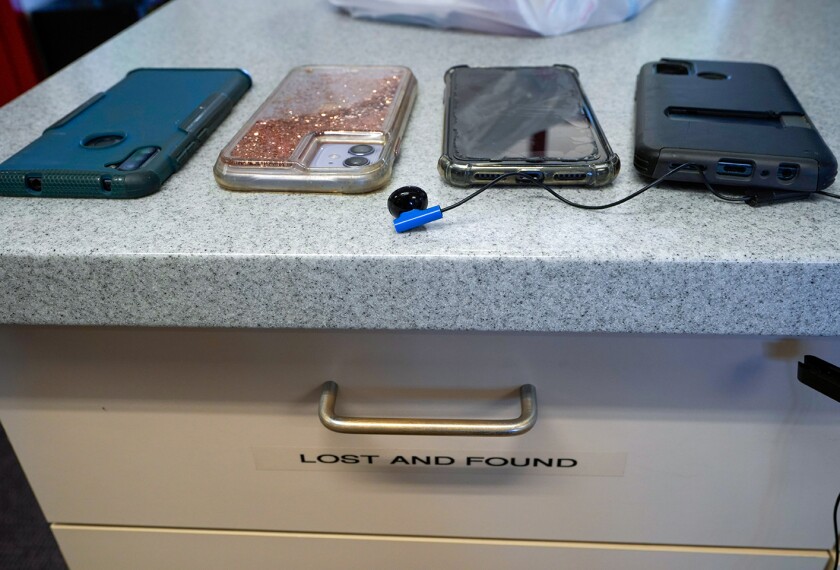The arguments against student cellphone use at school are explicit, serious, and incontrovertible: They’re a classroom distraction, an ongoing disruption to users and those nearby, and a conduit for online bullying.
So severe is the perceived risk they pose to students’ learning and mental health, that widespread bans on cellphones in schools are taking effect around the globe, with England being the latest to urge a complete ban of the devices by students on school campuses.
Until recently, such a sweeping cellphone ban in U.S. schools would have been unthinkable—and not just because decisions related to the nation’s school systems generally happen at the state and local levels. School officials blame strong opposition to schoolwide cellphone bans primarily on one powerful group of stakeholders: parents.
But that’s changing.
A committed group of parents are at the forefront of the latest salvo for cellphone-free schools, leading a campaign to ban the devices on K-12 campuses.
Highlighting these efforts is a “call to action” sent on Oct. 23 to U.S. Secretary of Education Miguel Cardona, urging him to issue an advisory regarding student cellphone use in K-12 schools. More than 60 advocates—including experts in the fields of psychology, early-childhood development, education, and technology—signed the letter. Six of its authors were parents, including Kim Whitman, a Kansas-based parent of two teenagers and co-founder of the Phone Free Schools Movement.
“We want to encourage a cultural change in our schools so students can be free from the distractions, pressures, and harms that access to phones/social media creates,” said Whitman. “We are parents that want to empower other parents.”
Convincing parents that cellphones don’t keep kids safe at school
At least initially, it might not be easy to convince all parents that a cellphone ban at their children’s schools is “empowering,” according to school officials who have implemented such policies. School shootings, and the subsequent fear they engender in parents, are far more common in the United States than in the United Kingdom, which has had a total of three in its entire history.
Jose Lebron, the principal at Kensington High School in the Philadelphia school district, is in his eighth year at the school. Soon after he started the job, he put a cellphone ban in place. Parents reacted strongly.
“Shortly after we sent out communication to students and parents [about the ban]—that’s when the uproar began. We were getting inundated with phone calls. Parents were going to their city council; complaints got all the way up to the superintendent’s office,” he said, “You would have thought the world was going to end.”
But he didn’t budge. “In my years as a principal in Philadelphia, I’ve tried every policy. The only approach that works is to keep phones out of the building, period,” Lebron said.
Safety concerns are chief among parents’ complaints, according to Lebron. “They say, ‘If something happens, my child needs to get in contact with me,’” he said.
In fact, violent incidents at the school have decreased since Lebron instituted the ban. “Serious incidents [of physical violence] have almost disappeared,” said Lebron, who noted that the only student-initiated fight this year occurred after school hours, blocks from campus, and that student suspensions due to physical confrontations are negligible.
That stands in stark contrast to when Lebron began his job as principal and hadn’t yet instituted the ban. That first year, a student used his cellphone while at school to communicate with an acquaintance outside the school about an ongoing student conflict. In response, the acquaintance delivered a gun to the school that was intended to “settle” the conflict. The young man was intercepted by school staff and no one was harmed, but the incident further convinced Lebron to institute a schoolwide cellphone ban.
Shifting cultural norms
By now, the school culture around cellphone use has shifted, according to Lebron. “It’s gotten to the point where it’s accepted,” he said, referring to the total cellphone ban on campus.
Whitman and other parents who support total cellphone bans at schools are hopeful that this cultural shift is expanding.
“Even in the last few years, I feel parents are so much more aware of the negative impact of cellphones and social media,” said Victoria Dunckley, a child psychiatrist who signed the letter to Cardona.
“We’re just getting started,” said Whitman, who has received a response from the Department of Education suggesting a meeting with the authors of the letter and a member of the department’s senior policy advisory team.






